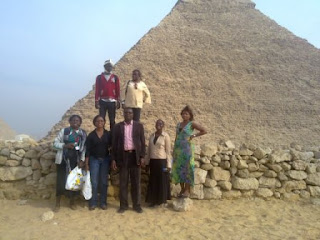In Nov. 2011, following the preliminary review of many proposals received under the African Women’s Forum for Science and Technology (AWFST) by the African Technology Policy Studies Network (ATPS), our proposal, “Moving Forward in a Changing Climate: Poverty Reduction Through Sustainable Environmental Management” (PRESEM) was short listed for presentation at the 2010 ATPS Proposal Tournament held during the ATPS Annual Conference and Workshop, 25 – 27 November, 2010 in Cairo, Egypt. The Team Leader, Ms. Joy Bongyereire participated in the conference and Proposal Tournament. Our proposal was successful and a Grant Agreement was signed between us and ATPS in December 2010. Below are beautiful pictures of Joy with Prof. Bob Orskov, fellow participants from Malawi and Nigeria at the ATPS Cairo Conference at Conrad.
Thursday, March 17, 2011
PELUM-UGANDA BOARD MEMBER VERIFIES BCRD-UGANDA FOR MEMBERSHIP
Following our application to PELUM-Uganda for membership in December 2010, a PELUM Board Member, Rev. Canon Nason Baluku who is also the Executive Director of New Eden Christian Foundation based in Kasese District, Western Uganda visited BCRD-Uganda office on 15th March, 2011 for verification. The meeting was attended by BCRD-Uganda staff and one Governing Council member. PELUM (Participatory Ecological Land-Use Management) Association is a regional network of over 200 civil society organizations in 10 countries in East, Central and Southern Africa working in the area of participatory ecological land use management. Country chapters include Uganda, Kenya, Tanzania, Rwanda, Malawi, Zambia, Zimbabwe, Lesotho, Botswana and South Africa. PELUM Uganda is a network of non governmental organizations in Uganda that have chosen to work together to improve the livelihoods of the poor. PELUM
Uganda builds the capacity of its members so that they are better able to provide relevant and quality ecological land use services to small holder farmers through participatory and gender responsive training, research and networking.
Like BCRD-Uganda, PELUM Uganda Chapter promotes food security, natural resources management and use of indigenous knowledge. The network also facilitates experimental learning through exposure and exchange visits, topical dialogue and debate at national and regional level. This is in a bid to enhance members’ awareness on trends and factors influencing their environment.
PARTNERSHIP NEWS: BCRD-UGANDA SIGNS A PARTNERSHIP AGREEMENT WITH VAADHS
In June 2010, BCRD-Uganda entered into partnership with VAADHS (Virunga Allied Actors for a Dynamic and Healthy Society), a dynamic CBO in Kisoro District whose patron is at the same time the District Health Educator. The two dynamic CBOs pledged to work together for robust community development in Kisoro District. Since we posses different skills, we felt that by combining efforts, we can harness our resident capacities and work together in proposal development and projects’ implementation in Kisoro District and elsewhere in the Albertine Rift. We view this as a cost-effective way of synergizing one another. We are convinced that we can utilize the resident capacities and skills existent within our CBOs to cause just and lasting social change and sustainable development. By doing this, we are in line with the Millennium Development Goal No.8 - Develop a global partnership for development.
A number of partnership proposals have been developed by the BCRD-Uganda Team Leader who graduated with a Master of Arts degree in Applied Community Change and Conservation from Future Generations Graduate School, WV USA (www.future.org) in October, 2007, and the VAADHS Patron, Mr. Abel Bizimana who possesses a Master of Science degree in Health Services Management from Uganda Martyrs University (UMU), Nkozi-Uganda. We will update all our esteemed readers of our blog on new developments regarding the fruition of our partnership efforts.
LATEST UPDATES: FUNDING NEWS
1. In July, 2010, BCRD-Uganda came to learn about a funding opportunity by the African technology Policy Studies Network (ATPS) from the Ecological Society for East Africa (ESEA) where the Team Leader has been a legally subscribed member since January 2009. A proposal was submitted, peer-reviewed by independent experts. In Nov. 2011, following the preliminary review of many proposals received under the AWFST (African Women Forum for Science and Technology), our proposal on “Moving Forward in a Changing Climate: Poverty Reduction through Sustainable Environmental Management (PRESEM)” was short listed for presentation at the 2010 ATPS Proposal Tournament that was held during the ATPS Annual Conference and Workshop, 25 – 27 November, 2010 in Cairo, Egypt. The proposal was successful and a Grant Agreement was signed between BCRD-Uganda and ATPS in December, 2010. The strategic goal of the US$ 11,550 for one year project is to support implementation of the ATPS Climate Sense program under the African Women’s Forum for Science and Technology (AWFST) Climate Change Innovation Program. The study will contribute towards building the capacity of Africa’s women in climate change adaptation and impacts mitigation, and resilience building through science, technology and innovation. The project seeks to restore degraded hills of Gihimbi in Buhozi Parish, Busanza Sub-county and Gishori in Rutaka Parish, Kirundo Sub-county for healthy ecosystems and improved livelihoods of the local smallholder farmers. The project will empower men and women to grow highly valued essential oil herbs and grasses on the bare hills mentioned above, as well as grow fruit and agro forestry trees on their farms as a means of combating climate change and other direct and indirect benefits.
2. Under the Lake Victoria Research Initiative (VicRes), a solar tunnel drier and tent drier were constructed for Kamaliba Landing Site fisher folks in April-May, 2010. Comprehensive scientific testing of the driers will be done this year by the lead scientist from Jomo Kenyatta University of Agriculture and Technology (JKUAT). The BCRD-Uganda Team Leader has been a VicRes socio-economic researcher since January 2006. The solar tent drier has proven efficient since large amounts of fish can be dried at ago, moreover in a day. There are many factors for these successes such as the nearness of the Equator of Kamaliba Landing Site as well as the fact that the tent drier’s performance enhancement was achieved with installation of the eco-vent (cyclones) which increases natural air flow rate, thus reducing humidity and increasing drying rate.
3. A contract has been signed between BCRD-Uganda and Minority Rights Group International (MRG), for a project titled “Peace building among Echuya Forest Adjacent Communities in Kisoro District.” The six months’ project has been funded to a tune of Uganda shillings 11,580,000. The beneficiaries comprise of indigenous Pygmies (Batwa) and non-Batwa living in three parishes namely Muhindura and Kagezi Parishes of Kanaba Sub-county and Chibumba Parish of Murora Sub-county, Kisoro District adjacent to Echuya Central Forest Reserve. The project also targets the local leaders at sub-county and village levels, and civil society organizations in the project area especially the United Organization for Batwa Development in Uganda (UOBDU) as well as parastatals notably the National Forestry Authority.
4. Our application to the Orskov Foundation for a £2,498 project on “Managing HIV/AIDS and Climate Change through the Diary Goat Revolving Scheme in Kisoro District, South-western Uganda” was successful. 48 households where members of Mbabazi and Twizere HIV/AIDS Groups come from in Nyakabande Sub-county will directly benefit from the project. The goal of the project is to contribute to improvement of livelihoods in households of PLWHA and ensure environmental sustainability through diary goat farming, agro forestry practices and mainstreaming of other cross-cutting issues. The resources for the project will be utilized to (I) Build the capacity of women through trainings and demonstrations on better animal and soil management practices (II) Provide inputs that will enable households to improve production and productivity for improved household incomes and environmental sustainability; (III) create awareness for improved health and the ABC strategy of preventing HIV/AIDS. Essential data that will be generated will include initial anthropometric variables from PLWHA such as body weight and mid upper arm circumference (MUAC). Blood chemistry will include CD4 Cell Count that will be carried out at regulated intervals at Mutolere Hospital where they have a CD4 count machine. Project implementers and stakeholders will carry out home-to-home routine extension visits to ascertain progress of project interventions.
5. The BCRD-Uganda Assistant Team Leader participated in an education program on Climate Change and Biodiversity Conservation at the Institute of Resource Assessment, University of Dar es Salaam in the United Republic of Tanzania from July-Sept, 2010. An externship research on “Community and Park management Adaptation and Mitigation Strategies to the Impacts of Climatic Variability and Climate Change. A case Study of Queen Elizabeth National Park Ecosystem-Uganda” is still on. The review process of the externship report is being carried out at the Institute of Resource Assessment (IRA), University of Dar es Salaam and START (SysTem for Analysis Research and Training). The BCRD-Uganda Assistant Team Leader along with five other participants from the Makerere and Kyambogo Universities, Uganda Wildlife Authority, WWF (Kasese Field Office) and Luweero District Local Government participated in the educational program from July-September, 2010.
We at BCRD-Uganda are all grateful to God the Almighty for the strides we’ve so far made in a bid to make our CBO a learning and successful grassroots organization. We continue to work hard and put all our efforts to God to give us the energy, strength and stamina to work hard, grow as individuals, as an organization, and make commendable difference in the livelihoods of the people we serve namely the smallholder farm families and indigenous peoples of the Central Albertine Rift Region of Africa. We believe that success falls not only to the brilliant, but also to those who decide and act. We’ll gradually achieve the change we believe in.
Subscribe to:
Posts (Atom)





















